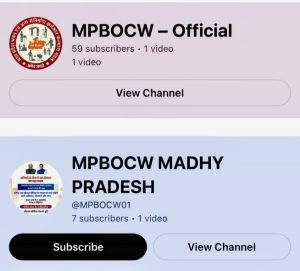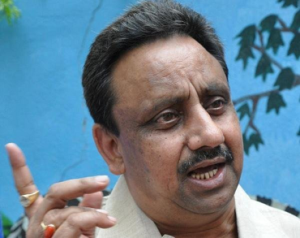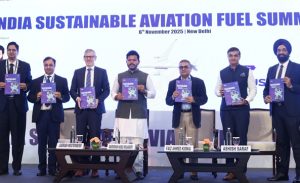- MoU signed between DoT and Ericsson for offering accredited courses on 5G for students of DoT’s 100 5G use case labs
- IMC 2024 to be held on 15-19 Oct 2024 at Pragati Maidan, New Delhi.
- India will host ITU’s prestigious World Telecom Standardization Assembly Delhi 2024 (WTSA 2024) from 15th – 24th Oct 2024.
- It is a momentous occasion that India is bringing WTSA to Asia for the very first time: ITU Director
New Delhi :- Minister of Communications Ashwini Vaishnaw today launched the Curtain Raiser of World Telecom Standardization Assembly Delhi 2024 (WTSA 2024) and India Mobile Congress (IMC 2024). The International Telecommunication Unions’ (ITU) prestigious WTSA event will be held from 15-24 Oct 2024 preceded by Global Standards Symposium (GSS 2024) on 14 Oct 2024 and eighth edition of Asia’s premier digital technology exhibition, IMC 2024 from 15-19 Oct 2024 at Pragati Maidan in New Delhi.
While emphasising the importance of collaboration and cooperation among stakeholders to propel the sector forward, the Telecommunications Minister announced telecom reforms and reiterated the government’s commitment to driving reforms in the telecom sector to create a conducive environment for investment and innovation. During the event, he also unveiled the policy on Spectrum Regulatory Sandbox that holds the potential of advancing India’s telecommunications landscape and fostering global collaboration in the field. Minister also announced a complete abolition of Wireless Operating License (WOL) that further simplifies the licensing processes in telecom.
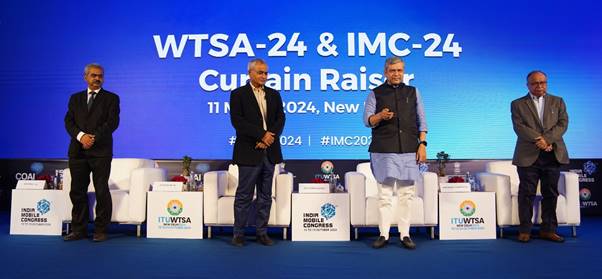
The Minister noted the significance of hosting the WTSA in India, saying that it presents an opportunity for global engagement and impact. He proposed involving engineering colleges nationwide and their students in event discussions, aiming to ignite young minds and foster innovation. The MoC underlined the pivotal role of technology in advancing the country’s development and advocated for initiatives such as setting up 5G labs and modifying course curriculum to integrate students into technology programs from an early stage.
Mr. Ashwini Vaishnaw also pointed out that the implementation of regulatory sandboxes to streamline equipment testing procedures will go a long way in fostering innovation and ease of access. He also said that the removal of the wireless operating license requirement, reflects ongoing reforms to facilitate technological progress. He called for upscaling the IMC 2024 by involving many more Tech-companies, Tech Universities and creating awareness among students about evolving technologies.
An MoU was also signed between the Department of Telecommunications and Ericsson in presence of the Minister for offering accredited courses on 5G for students of DoT’s 100 5G use case labs. The project aims to strengthen capacity building and skill development in the 100 5G use case labs, enabling institutes to mentor students and faculties in creating innovative 5G products and use cases.
Telecom Secretary Dr. Neeraj Mittal said that we are on the cusp of a rising era in technological landscape and stressed on the need for universal participation. He sought cooperation from all stakeholders to make the IMC 2024 much more upscale than the IMC 2023. Dr. Mittal pointed out that there has been acknowledgment of the previous year’s success at IMC 2023 and the positive feedback received at international events like MWC 2024 in Barcelona. He said, with support from the govt. and industry we need to scale up IMC from Asia largest forum to a global level.
Dr. Mittal also said, the WTSA 2024 offers a golden opportunity to set up new standards for us. He outlined that reforms such as the launch of Spectrum Regulatory Sandbox and Abolition of Wireless Operating license requirement are notable as steps to unleash telecom’s potential. He said, plans are discussed to engage students and educational institutions more effectively, and emphasised on the importance of gender diversity with a focus on encouraging more participation from young women.
The Secretary suggested to organize side events in technology hubs like Hyderabad, Pune, Bangalore, and Chennai to broaden participation, alongside events like IMC 2024.
Dr. Mittal also distributed Certificates to some girl students on Courses on 5G.
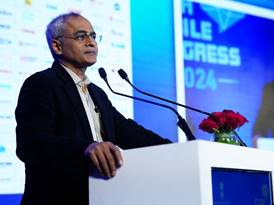
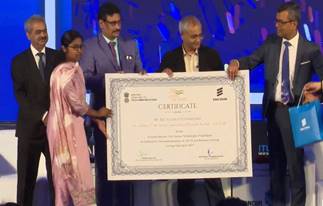
Sh. Seizo ONOE, ITU Director of Telecom Standardization Bureau (TSB), joined the prestigious event virtually and stressed on ITU’s commitment to safety and inclusivity in AI and digital tech, urging collaboration. Recognizing India’s role in digital development, he praised India’s perspective and innovation in digital inclusion. He also highlighted that the IMC will provide the excellent opportunity for the international committee to meet with Indian Innovators.
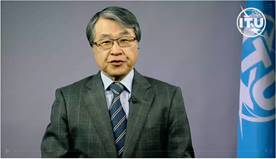
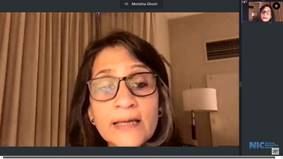
Dr Monisha Ghosh, Professor, University of Notre Dame, joined the event virtually as a foreign delegate. In her address, she said India’s prominence in the global tech sphere is underscored by hosting ITUWTSA-2024 and the anticipated success of IMC-2024, showcasing its leadership in technology gatherings. She emphasized for more collaborative efforts between the US and India in telecom initiatives, spectrum management and research.
COAI Chairman, Mr. P K Mittal, Dot officials, industry leaders, and academia were among those present on the occasion.
The WTSA 2024 is expected to attract over two thousand technology developers, industry leaders, academicians, and policymakers from 193 member countries along with more than 900 associate/ sector members of ITU. It sets the standardization agenda of telecom/ ICT sector for next four years in ITU. WTSA also structures the Study Groups (SGs) of ITU – Standardization. India’s participation is crucial for shaping global agendas in emerging technologies such as 6G, IoT, SatCom, Quantum and AI.
The proposal to host the IMC 2024 concurrently with WTSA will provide Indian technology companies with a global platform to showcase their prowess and contribute to the development of a robust standardization ecosystem.
IMC 2024, Asia’s largest technology forum and a well-known platform, provides the perfect pretext for showcasing innovative solutions, services and state-of-the-art use cases for industry, government, academics, startups and other key stakeholders in the technology ecosystem. This year, the focus will be on Artificial Intelligence, Quantum technology and Circular Economy along with spotlight on 6G, 5G use-case showcase, cloud & edge computing, IoT, semiconductors, cybersecurity, green tech, satcom and electronics manufacturing.
Aspire, the flagship start-up program introduced in IMC 2023, is expected go bigger this time. The initiative drew participation from 402 startups from a wide range of industries, 40 angel investors, and 50 VC funds, facilitating 250 1-on-1 investor meetings and resulting in 2 startups receiving funding through the IMC platform.
The prestigious ITU Conferences and IMC 2024 are expected to witness around 8,000 plus CXOs and industry delegates, 150,000 plus attendees, 350+ exhibitors, 400+ speakers, 80+ sessions.
The launch of these initiatives underscores the Government’s unwavering commitment to promoting technological advancement, fostering innovation, and ensuring equitable access to telecommunications services for all citizens. The DoT invites all stakeholders from across the industry, academia, and civil society to join at WTSA 2024 to be a part of the journey towards a connected and inclusive digital future.
Background:
- WTSA 2024 and Related Events: International Telecommunications Union (ITU) is a specialized agency of United Nations for telecom/ ICT. The Telecommunication Standardization Bureau (TSB) of ITU conducts the World Telecommunication Standardization Assembly (WTSA) once in every four (4) years to plan its standardization programme for the next 4 years. India is hosting the prestigious international conferences – World Telecommunication Standardization Assembly (WTSA 2024) from 15-24 Oct, 2024 preceded by Global Standards Symposium (GSS 2024) on 14 Oct 2024 at New Delhi. They play a crucial role in shaping the global agenda for standardization of telecom and information and communication technologies (ICTs). The WTSA 2024, will be accompanied by other related initiatives such as the ITU Kaleidoscope conference (21-23 Oct 2024), ITU exhibitions (14-24 Oct 2024), Network of Women (17 Oct 2024) and AI for Good (18 Oct 2024) to enrich the discourse and promote inclusivity in the sector. Additionally, a Hackathon prior to the event will further provide a platform to developers to showcase different solutions.
- Telecom Reforms:
Spectrum Regulatory Sandbox (SRS) and Wireless Test Zones (WiTe Zones): The Government has introduced guidelines for the Spectrum Regulatory Sandbox (SRS), or Wireless Test Zones (WiTe Zones), as part of the Millennium Spectrum Regulatory Sandbox initiative to foster innovation, enhance ease of doing business, promote “Make in India” in the telecommunications sector. This initiative provides a simplified regulatory framework to facilitate Research and Development (R&D) activities, promoting exploration of spectrum bands and driving technological advancements. WiTe Zones are categorized into urban or remote areas for experimentation across various frequency bands, with eligibility extending to academia, R&D labs, telecom providers, and others. This move signifies the government’s commitment to nurturing innovation and propelling India as a global leader in telecom technology.
Abolition of Wireless Operating License (WoL): In November 2016, the requirement of Wireless Operating License (WoL) for Access Services authorization in CMTS/ UAS/ Unified License was abolished. Further, with effect from 15.11.2022, requirement to obtain WOL for Very Small Aperture Terminal (VSATs) operating under Commercial VSAT CUG license has been done away with. In continuation of telecom reforms, to reduce compliance burden on Service Providers and promote ease of doing business, the requirement of WOL for licensees under section 4 of Indian Telegraph Act, 1885 have been abolished altogether. Henceforth no separate WoL is required by any Licensed entity under section 4 of Indian Telegraph Act, 1885 for establishing, maintaining or working of telecommunication including radio equipment. The removal of the WoL requirement simplifies the licensing process, saving time for telecom service providers and aligning with the initiatives of DoT to drive innovation and improve the ease of doing business.
- MoU with Ericsson: DoT has collaborated with Ericsson for the “Ericsson Educate” program, designed to enhance digital skills for students in the universities where 5G Use case labs have been established.. The curriculum, tailored for telecommunication subjects, supplements technical studies with practical knowledge using 100 5G use case labs, crucial for the telecom sector. The collaboration aims to strengthen capacity building and skill development in the 100 5G use case labs, enabling institutes to mentor students and faculties in creating innovative 5G products and use cases. The program is exclusively tailored for these 5G use case labs and includes a three-month accredited course by Ericsson offering learning materials on key technologies such as Automation, Telecommunications, AI, IoT, 5G, and Machine Learning. It is planned for training around 10000 students in the next two years.
************
